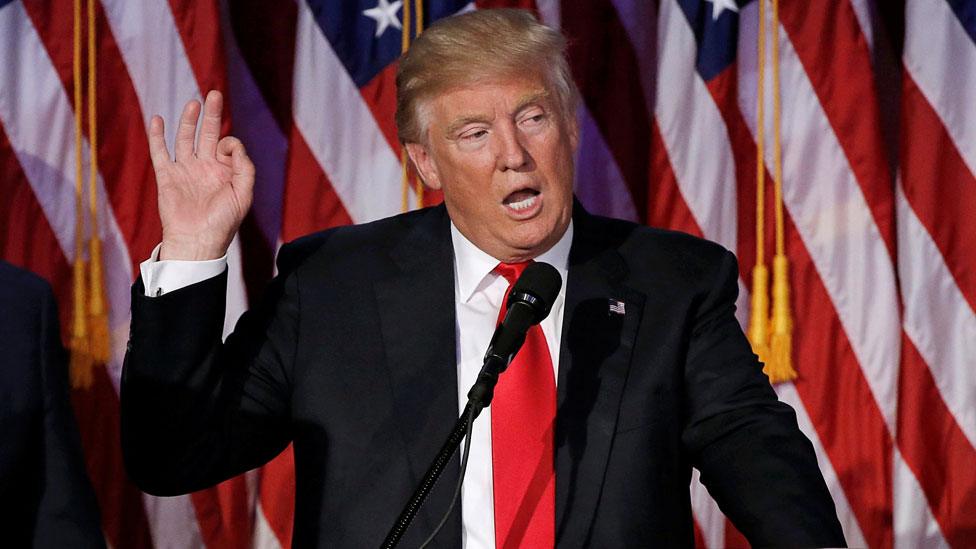Three minutes of Trump - decoded line by line
- Published
Russian interference? No-one knows - Trump
There's an old saying in Washington that politics should "stop at the water's edge".
It reflects the tradition that, while a president is overseas, domestic bickering should be put on hold, as partisan grievances are best kept within the family.
Those norms, which used to be considered iron-clad, have frayed considerably in recent decades. Leave it to Donald Trump, however, to throw kerosene on whatever remains and dance around the ashes.
In a three-minute exchange with reporters in Warsaw, Mr Trump aired a wide range of his usual grievances - against the US media, his presidential predecessor and the US intelligence community.
Here's a closer look:

Trump:"I've said it very simply, I think it could very well have been Russia but I think it could well have been other countries and I won't be specific, but a lot of people interfere."
Anthony: The question that set Mr Trump off, from MSNBC reporter Hallie Jackson, was direct. "Will you once and for all yes or no definitively say that Russia interfered in the 2016 election?"
His answer was far from a definitive "yes". Instead he engaged in several paragraphs worth of water-muddying along the lines of past remarks, external, where he has suggested the Chinese or some "400-pound person sitting in bed" could be the true culprit behind the email hacks of top Democratic officials in 2016.

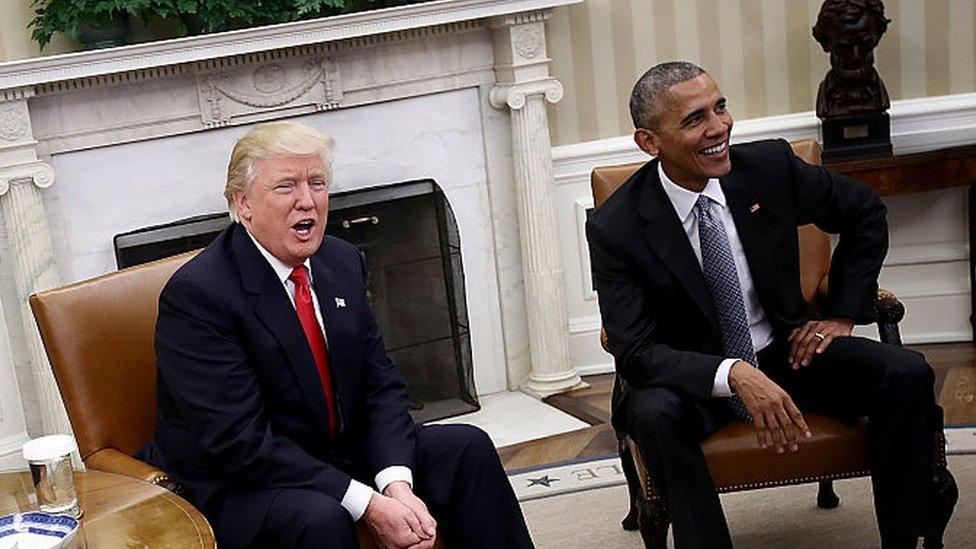
Donald Trump and Barack Obama may have been chummy last November, but Trump is now blasting his predecessor
Trump: "Barack Obama, when he found out about this in terms of if it was Russia, found out about it in August. Now the election was in November. That's a lot of time he did nothing about it."
Anthony: According to the Washington Post article, external that detailed the extent of the information available to Mr Obama at the time - including that Russian President Vladimir Putin had directly ordered election meddling - the then-president took several steps.
In September, he directly warned Mr Putin face-to-face to stop Russian cyber-activities in the US. He directed his intelligence officials to reach out to congressional leadership, although the Republicans were reluctant to participate in any bipartisan call for action.
He also informed state governments to ensure that their electoral systems were secure.

Trump: "They say he choked. Well, I don't think he choked."
Anthony: Mr Obama's response didn't go over well with everyone in his administration. Mr Trump is referencing a line in that same Washington Post article, from a senior Obama official who felt the US government didn't do enough to punish Russia for what appeared to be a brazen attempt to destabilise the US election.
There's a certain amount of irony that Mr Trump would highlight this anonymous remark, given how frequently he and his aides have condemned reliance on anonymous sources in news stories critical of his own administration.

Trump: "He thought Hillary Clinton was going to win the election and he said let's not do anything about it. Had he thought the other way he would have done something about it."
Anthony: The Washington Post article reported that Mr Obama decided not to go public with the evidence of Russian involvement because of concerns that it might provoke further Russian action, reveal US intelligence-gathering resources or be cited by Mr Trump as evidence that Democrats were "rigging" the US election against him, an accusation he was regularly making in the closing days of the presidential campaign
Mr Trump has apparently concluded that if the situation for Mrs Clinton had appeared more dire, he would have been more aggressive in his response. It's a charge that is impossible to prove, of course - but it allows Mr Trump once again to bask in the unexpected nature of his presidential triumph.

Trump: "I heard it was 17 agencies. Boy, that's a lot. Do we even have that many intelligence agencies?"
Anthony: Yes, the US does, external. The CIA and the FBI are the big ones, but there are also intelligence divisions within the State, Defence, Homeland Security, Treasury and Energy departments, as well as multiple military intelligence offices.
It's not something most Americans would be expected to know. Whether those at the top of the US government should have a basic familiarity with the nation's national security establishment is another question.
Mr Trump brings this up because of New York Times and Associated press reports that all 17 agencies had signed off on the conclusion that Russia had meddled in the 2016 US election.

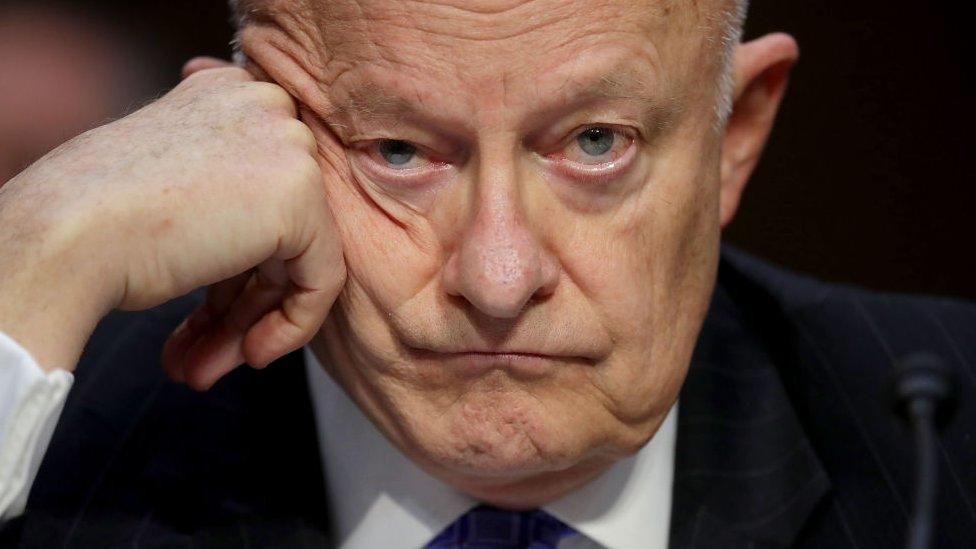
Former Director of National Intelligence James Clapper has said the FBI, CIA and NSA gathered evidence of Russian election meddling.
Trump: "We did some very heavy research, and it turned out to be three or four. It wasn't 17 and many of your compatriots had to change their reporting, and they had to apologise and they had to correct."
Anthony: It seems like it wouldn't take too much "heavy research" for the administration to discover the findings of its own intelligence apparatus, but the president is correct that the New York Times and Associated Press have corrected, external their initial reports.
The assessment that Russia interfered in the 2016 election was the result of efforts by the Federal Bureau of Investigation, Central Intelligence Agency and National Security Agency, and published in a report by the Office of the Director of National Intelligence, which represents all US intelligence agencies. Other intelligence divisions, like Coast Guard Intelligence, the National Geospatial-Intelligence Agency and the Drug Enforcement Administration's Office of National Security Intelligence would have had nothing relevant to add to the report.
Obama Administration Director of National Intelligence James Clapper pointed this out multiple times during testimony before Congress on 8 May, but the media outlets only recently modified their original articles.
Neither the Associated Press or the New York Times "apologised", however.

Trump: "I remember that I was sitting back listening about Iraq. Weapons of mass destruction. How everybody was 100% sure that Iraq had weapons of mass destruction. Guess what, that led to one big mess. They were wrong."
Anthony: During the Republican primary campaign Mr Trump frequently criticised George W Bush and members of his administration for launching the Iraq War based on the faulty conclusion that Saddam Hussein was pursuing a chemical, biological or nuclear weapons programme.
At the time it was considered remarkable that a Republican candidate would break with party orthodoxy on the merits of the military operation.
Making those charges on a debate stage is one thing, however. Highlighting the shortcomings of US intelligence on foreign soil, in front of the world media, while standing next to a fellow head of state, however, is astounding.

Trump: "I think what CNN did was unfortunate for them, as you know now, they have some pretty serious problems. They have been fake news for a long time, they've been covering me in a very dishonest way. Do you have that also, Mr President?"
Anthony: It was probably inevitable that Mr Trump would be asked to comment about Sunday's CNN-wrestling tweet, and he took the opportunity to take another swipe at the US cable news network.
What makes this time a different, of course, was the president's aside to the Polish leader, who has been accused of cracking down on his own nation's free press. He recently blocked adversarial reporters from covering parliament and in January 2016 fired the executives of the nation's public radio and television networks, replacing them with individuals more friendly to the government.
Trump to BBC correspondent Jon Sopel: Here's another beauty
Such an action is well outside of the power of a US president, but the New York Times did note that Mr Trump isn't without his own "leverage" over CNN, as his administration is currently reviewing whether to let the network's parent company, Time Warner, merge with telecommunications giant AT&T.
"Mr Trump's Justice Department will decide whether to approve the merger, and while analysts say there is little to stop the deal from moving forward, the president's animus toward CNN remains a wild card," the paper reports.

Trump: "NBC equally is bad, despite the fact that I made them a fortune with The Apprentice, but they forgot that."
Anthony: NBC News officials will likely howl at the insinuation that their coverage could ever be influenced by commercial considerations of their network - even if the Apprentice, at least early in its 14-season run, was a ratings success.
Donald Trump didn't make out too badly from his involvement with his reality television show, either. According to campaign disclosures, he earned more than $213m from the programme.
And the visibility he received from being portrayed as a take-charge executive once a week on prime-time commercial television?
That, as they say, was priceless.
- Published2 July 2017
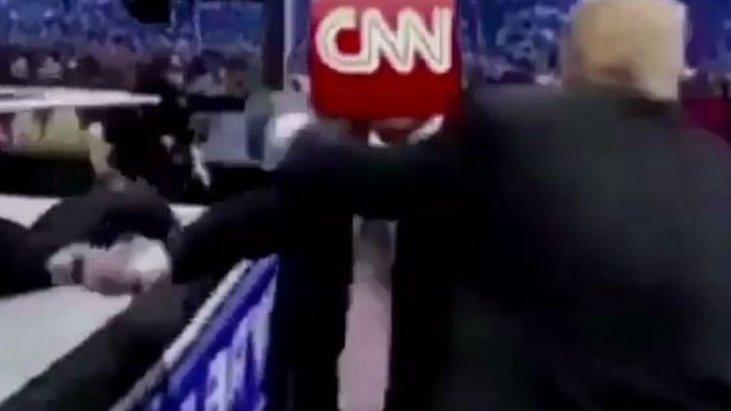
- Published2 July 2017
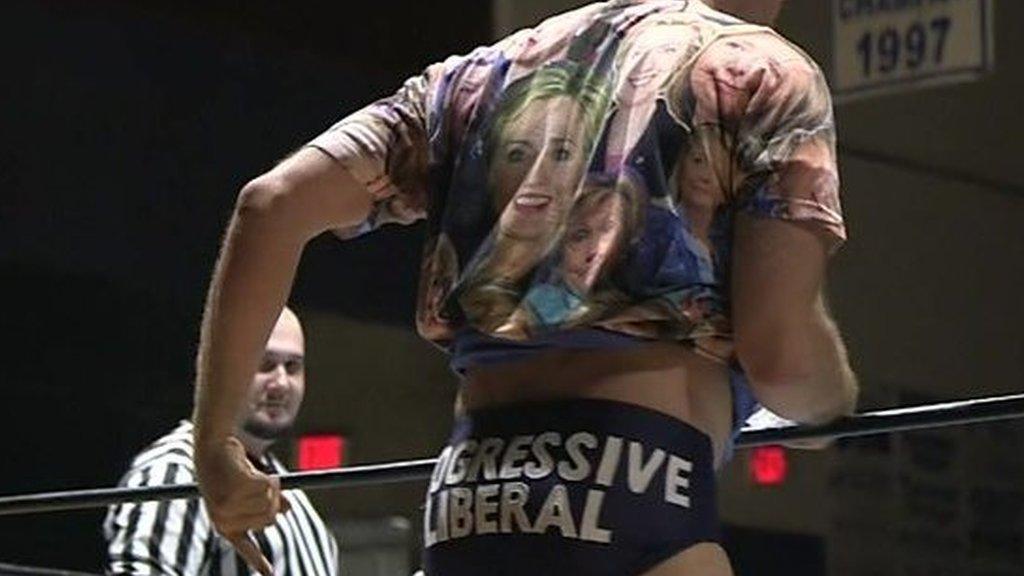
- Published14 November 2016
